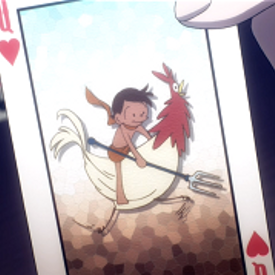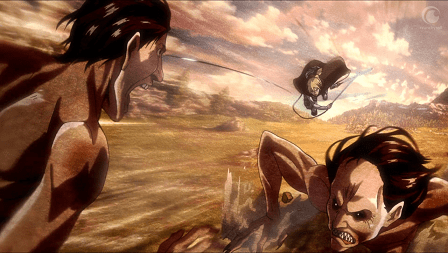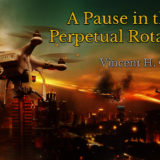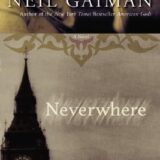Fantasy, Horror and Science Fiction can exist in the real world, or create hermetic worlds of their own. Which is to say genre fiction can follow the rules of the real world, or make its own rules up, ignoring reality completely. Most genre fiction falls somewhere in-between. At one extreme is Orwell’s Nineteen Eighty-Four, a novel so realistic much of the reading world doesn’t consider it SF at all. At the other, how about Alice’s Adventures in Wonderland?
Which brings us to the Doctor Who Christmas special, The Snowmen, in which a young woman and new companion for the Doctor falls down a metaphorical rabbit hole in Victorian London. As Doctor Who approaches its 50th birthday Steve Moffat’s writing and show-running has turned the programme more into a meta-fictional game with its own history than anything engaging with actual history.
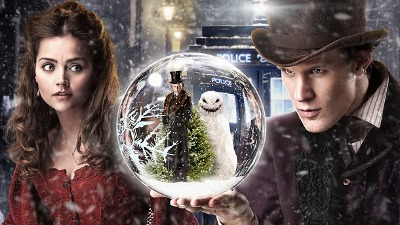 Set in London in 1842 and 1892, the 50 year time span echoes the 50 year life of the programme. (not program or show – Doctor Who is British, and it runs in series, not seasons). The new companion is called Clara Oswin Oswald and she was born on 23 November, the same date the first episode of Doctor Who was first broadcast. According to her gravestone she died 26 years later, just as the original run of Doctor Who was cancelled after 26 years. Clara has already lived and died twice, just as Doctor Who the programme has lived and expired twice, if one counts the TV movie pilot broadcast in 1996 but never followed-through with a new series. Clara’s full name suspiciously echoes that of Lee Harvey Oswald, whose assassination of US President John F. Kennedy the day before the transmission of the first episode of Doctor Who resulted in the broadcast of that episode being delayed due to extended news coverage. So far, so intriguing.
Set in London in 1842 and 1892, the 50 year time span echoes the 50 year life of the programme. (not program or show – Doctor Who is British, and it runs in series, not seasons). The new companion is called Clara Oswin Oswald and she was born on 23 November, the same date the first episode of Doctor Who was first broadcast. According to her gravestone she died 26 years later, just as the original run of Doctor Who was cancelled after 26 years. Clara has already lived and died twice, just as Doctor Who the programme has lived and expired twice, if one counts the TV movie pilot broadcast in 1996 but never followed-through with a new series. Clara’s full name suspiciously echoes that of Lee Harvey Oswald, whose assassination of US President John F. Kennedy the day before the transmission of the first episode of Doctor Who resulted in the broadcast of that episode being delayed due to extended news coverage. So far, so intriguing.
Recently the Doctor has been involved with the Apollo program, which of course was initiated by President Kennedy. Presumably there will be some intersection with the Kennedy assassination in Doctor Who’s 50th anniversary episodes this November. Id so this will put the programme in a long line of SF which has revisited the events of that fatal day in Dallas, not least Quantum Leap, Red Dwarf, and Stephen King’s recent novel, 11.22.63.
The original series of Doctor Who didn’t play intricate, rarely resolved, games with time. The Doctor and his companions used the Doctor’s time machine to arrive somewhere in the past or future and have an adventure. Time travel rarely more than an enabling means of transport, hardly ever featuring significantly in the ensuing story. As a child this disappointed me greatly, and I always preferred the stories set in the future or on another world, in which there would be monsters and strangeness. I found the historical tales, well… too historical. Old or original Who had a remit from the beginning to educate as well as entertain. Stories set in the past tended to have as much historical veracity as the production values would allow. There was some attempt at characters behaving authentically, even if they did all speak perfect English.
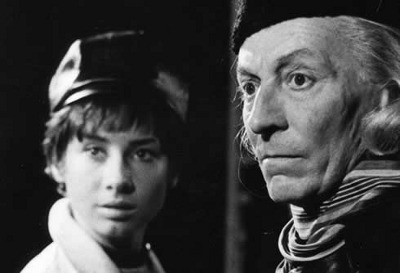 Now in Doctor Who’s hermetically sealed universe, late Victorians don’t find it particularly remarkable that a Sontaran warrior is wandering around the London of 1892, or that a young woman is openly married to a female Silurian, a race of reptilian humanoids. That in the real London of 1892 there were no Sontarans or Silurians, and that the idea of gay marriage didn’t exist, seems irrelevant. This is a steampunk fantasy aimed at the audiences of 2012, with tongue in firmly in cheek.
Now in Doctor Who’s hermetically sealed universe, late Victorians don’t find it particularly remarkable that a Sontaran warrior is wandering around the London of 1892, or that a young woman is openly married to a female Silurian, a race of reptilian humanoids. That in the real London of 1892 there were no Sontarans or Silurians, and that the idea of gay marriage didn’t exist, seems irrelevant. This is a steampunk fantasy aimed at the audiences of 2012, with tongue in firmly in cheek.
Entertainment often makes the past more like the present. It does so to make things easier for both writers and audience. So often costume dramas – and SF or Fantasy set in the past or future is, whatever else, costume drama – make characters in the past or future just like people today but with different clothes. The attitudes barely differ from those of whenever the book was written or film or TV programme made. This is easier for the writers (less research required) and easier for the reader or audience (no imagination required). Producers will tell us they have made their characters ‘relevant’. By which they mean, ‘we’ve simplified and lied about the past to make it something you can relate to with minimum effort’. They will also have skirted the possibility of causing offence by erasing historically accurate attitudes – racism, sexism, etc. – which simply wouldn’t be acceptable now in characters intended to be read as sympathetic and heroic.
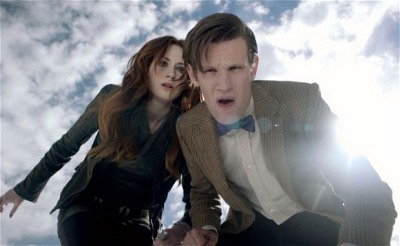 With this default state of revisionism, it’s easy to forget how different even the fairly recent past was. In some ways the real Victorian London was so different from London today that alien warriors and lizard ladies don’t seem that strange or out of place. I’ve been reading the most astonishing book, London in the 19th Century, by Jerry White. On the spine is a one word quote from the Financial Times. It simply says ‘brilliant’. It is all that needs to be said. This book packs an mind-boggling amount of information into its 478 pages (plus extensive notes, bibliography and index), all of which shows that on every level, in every class, and in every aspect of life – work, leisure, health, entertainment, transport, housing, but above all, in thought and attitude – the world of 19th century London was entirely different to anything we experience now. It was a world of dirt and chaos and poverty and public drunkenness and birdsong contests and dead horses, riots in theatres and massive mobile advertisements, Crystal Palaces and debtors prisons and musichalls and dog fighting and railway mania. A world in which on the night of 4-5 March 1856 the Covent Garden Theatre house a ‘grand bal masque’ at which the ”masquers and onlookers were said to have indulged in ‘undisguised indecency, drunkenness, and vice, such as the lowest places of resort have rarely witnessed’.” That’s not normally how we think of the Victorians.
With this default state of revisionism, it’s easy to forget how different even the fairly recent past was. In some ways the real Victorian London was so different from London today that alien warriors and lizard ladies don’t seem that strange or out of place. I’ve been reading the most astonishing book, London in the 19th Century, by Jerry White. On the spine is a one word quote from the Financial Times. It simply says ‘brilliant’. It is all that needs to be said. This book packs an mind-boggling amount of information into its 478 pages (plus extensive notes, bibliography and index), all of which shows that on every level, in every class, and in every aspect of life – work, leisure, health, entertainment, transport, housing, but above all, in thought and attitude – the world of 19th century London was entirely different to anything we experience now. It was a world of dirt and chaos and poverty and public drunkenness and birdsong contests and dead horses, riots in theatres and massive mobile advertisements, Crystal Palaces and debtors prisons and musichalls and dog fighting and railway mania. A world in which on the night of 4-5 March 1856 the Covent Garden Theatre house a ‘grand bal masque’ at which the ”masquers and onlookers were said to have indulged in ‘undisguised indecency, drunkenness, and vice, such as the lowest places of resort have rarely witnessed’.” That’s not normally how we think of the Victorians.
The truth is we usually see the past and the future as being too much like the present, with a costume change. Whether one wants to write an hermetically sealed fantasy true only to itself, or to create fiction engaged with the real past or plausible imagined future, the imaginative task is to organise a level of detailed difference which sets that past or future apart from our present. With the current vogue for Steampunk and Victorian London I can’t recommend Jerry White’s book highly enough. (He has also written superb volumes on London in the 18th and 20th centuries). But for any past period setting research is essential, for any future, copious hard imaginative work. TV and the movies always get it wrong, never get the past or future rich or complex or detailed or strange or different enough. The real past, where really interesting SF and Fantasy might transpire, was as strange as the strangest futures most of us will ever conceive.


